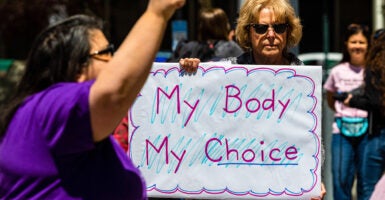If you visited the Supreme Court in the days following the leak Monday night of a draft majority opinion in the abortion case known as Dobbs v. Jackson Women’s Health Organization, you would have seen many signs saying, “My body, my choice.”
Choice means options, and it implies empowerment. But that isn’t the message of pro-abortion activists, one adoption advocate says.
The anthem of the pro-abortion forces long has been that they’re “pro-choice,” said Herbie Newell, president and executive director of Lifeline Children’s Services, but “the only choice that they’re providing is abortion.”
With a Supreme Court majority apparently set to overturn its 1973 decision in Roe v. Wade, which legalized abortion on demand across the nation, Newell says, adoption gives women a choice of hope when they’re faced with an unplanned pregnancy.
Lifeline, a Christian foster care and adoption agency, works domestically and internationally to serve the needs of vulnerable children.
In 2021, Lifeline Children’s Services says, its pregnancy ministry placed 38 babies for adoption with loving families.
During a phone interview with The Daily Signal, Newell recalled the story of a young woman named Lili, who Lifeline helped in her journey to choose life. The Daily Signal isn’t using her full name to protect her privacy.
Lili, who recently shared her story on “The Defender Podcast,” learned that she was pregnant during the COVID-19 pandemic.
She went to get an abortion at a clinic, which performed an ultrasound.
When Lili asked to see the ultrasound image, or sonogram, the sonographer said no, that was against protocol. But Lili persisted, asking again to see the ultrasound results. Finally, the sonographer agreed.
The sonogram revealed that Lili was pregnant with twins. The thought of ending not one but two lives was more than she could bear, Lili said on the podcast, and she walked out of the abortion clinic.
Within a few minutes, she received a phone call from a family member. When she explained her situation, the relative told her about Lifeline Children’s Services. Lili contacted the organization and met with a Lifeline counselor later that day.
At the end of 2020, Lili’s two baby girls were placed for adoption. Lili chose an open adoption, meaning she is in touch with the adoptive family and the twins will grow up knowing their birth mother.
For Lili, adoption was the best choice, as it is for many other women faced with unplanned pregnancies, Newell told The Daily Signal, while acknowledging that adoption is “not the best option for every woman.”
Take Robyn Chambers’ story.
When Chambers learned she was pregnant as a young, unmarried woman, she considered adoption. But ultimately she made the choice to parent, Chambers told The Daily Signal during a phone interview Tuesday.
Chambers, 59, said that because her parents and the baby’s father were supportive, “abortion was never a conversation that we had.”
Chambers and her boyfriend decided to get married and parent their baby. Now, 43 years later, she is helping other women navigate the challenges of unplanned pregnancies.
As executive director of advocacy for children at Focus on the Family, Chambers works with pregnancy centers, churches, and foster care and adoption agencies, offering support and resources so they can serve the needs of babies, children, and families.
Adoption provides mothers with choice, both Newell and Chambers said.
Today, adoptions vary dramatically. A birth mom can choose a closed adoption, in which she won’t maintain contact with the adoptive family and her child; a partially open adoption, in which the birth mom might exchange pictures and letters with the adoptive family; or an open adoption, meaning the birth mother will visit the adoptive family and her child.
Organizations such as Safe Families provide temporary foster care to allow a mother or parents time to get back on their feet and prepare to parent again.
For too long, adoption has had a negative stigma, Chambers says.
“Even verbiage that you’ve heard over the years of ‘giving your child up’ or ‘giving your child away,’ that’s such a negative way to talk about a beautiful story that that woman can walk through,” Chambers told The Daily Signal.
When a mom chooses adoption, she is saying that “abortion is not for me,” Chambers said.
By using “positive verbiage” about adoption, she said, “I think that we can change the culture [and] the mindset of adoption.”
Honoring and supporting a birth mother during and after her pregnancy is “one of the keys to really changing the narrative around adoption,” Chambers said.
Like Newell, Chambers acknowledges that no one-size-fits-all solution exists for women and families facing an unexpected pregnancy.
But, she said, “adoption is a way to drive down the number of abortions in the United States.”
Have an opinion about this article? To sound off, please email [email protected] and we’ll consider publishing your edited remarks in our regular “We Hear You” feature. Remember to include the url or headline of the article plus your name and town and/or state.































